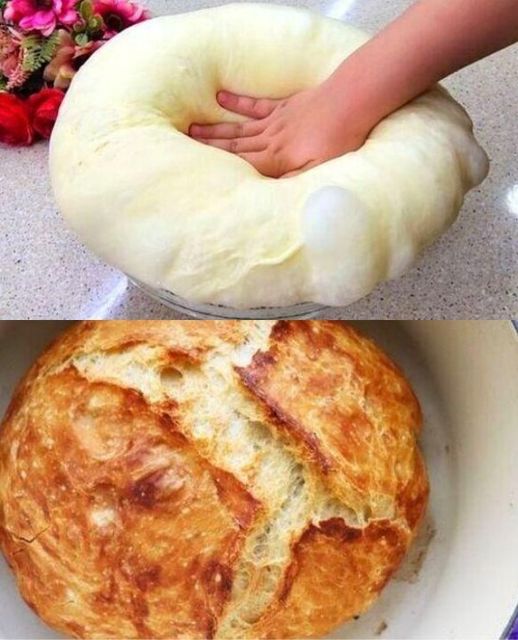No-Rise Spelt and Wheat Bread Recipe
Ingredients
- 1 1/4 cups spelt flour (150 g)
- 2 1/2 teaspoons salt
- 2 3/4 cups wheat flour (350 g)
- 1 1/4 cups whole spelt flour (150 g)
- 2 teaspoons bread spice
- 1 3/4 – 2 1/8 cups water (420 – 500 ml, lukewarm)
- 2 1/4 teaspoons dry yeast
- 2 tablespoons white wine vinegar
Preparation Tips
- Preheat the Oven:
- Set your oven to 220°C (428°F).
- Place a bowl of water at the bottom of the oven to create steam, which helps develop a crispy crust on the bread.
- Mix Dry Ingredients:
- In a large mixing bowl, combine spelt flour, wheat flour, whole spelt flour, salt, and bread spice.
- Stir well to ensure the ingredients are evenly distributed.
- Prepare Yeast Mixture:
- Heat the water until lukewarm—this helps activate the yeast effectively.
- Dissolve the dry yeast in the warm water.
- Add the white wine vinegar to the yeast mixture. The vinegar helps neutralize the yeast taste, extends the bread’s shelf life, and prevents mold growth.
- Combine Ingredients:
- Using a food processor or a mixer with a dough hook, gradually add the yeast and vinegar mixture to the dry ingredients.
- Continue mixing until a dough forms. The dough should be slightly sticky but firm enough to hold its shape.
- If necessary, adjust the water to get the right consistency, adding a little more if the dough is too dry or reducing if it’s too wet.
Baking Process
- Shape the Dough:
- Once the dough easily pulls away from the edge of the bowl, remove it and gently shape it into a round or oval loaf.
- Place the shaped dough into a heat-resistant pot or Dutch oven lined with parchment paper.
- Prepare for Baking:
- If desired, make a few cuts on the surface of the dough to allow it to expand evenly during baking. These cuts can be decorative and help control the bread’s shape.
- Bake:
- Place the pot with the dough in the preheated oven and bake for 40-45 minutes at 220°C.
- After 40 minutes, reduce the oven temperature to 180°C (356°F) and remove the bowl of water from the oven.
- Continue baking for an additional 30 minutes or until the bread is golden brown and fully cooked.
Cooling and Testing
- Cool the Bread:
- Allow the bread to cool briefly in the pot, about 10 minutes, to let it firm up.
- Transfer the bread to a cooling rack to cool completely.
- Test for Doneness:
- To check if the bread is done, tap the bottom of the loaf—it should sound hollow.
- If it doesn’t, return the bread to the oven for a few more minutes.
Benefits of Using Vinegar
- Neutralizes yeast taste: Vinegar balances out the yeast flavor, making the bread taste cleaner.
- Extends shelf life: The acidity from the vinegar helps preserve the bread, keeping it fresh longer.
- Prevents mold growth: Vinegar’s natural properties help inhibit mold, ensuring your bread stays safe to eat.
Tips for Better Results
- Use lukewarm water: This activates the yeast effectively without killing it, ensuring a good rise.
- Avoid over-kneading: Overworking the dough can make the bread dense. Mix just until combined.
- Experiment with flour: Try different ratios or types of flour (e.g., rye, whole wheat) to create unique flavors and textures.
Understanding the Technique
This no-rise bread technique is all about efficiency. The vinegar acts quickly with the yeast and warm water, allowing the dough to rise during the baking process rather than before. This method is perfect for those who want fresh bread without the wait, producing a loaf that’s light, airy, and full of flavor in a fraction of the time.
Nutrition Information
- Serving Size: 1 slice (based on 12 slices)
- Calories: Approximately 150 kcal
- Total Fat: 1.5g
- Saturated Fat: 0.5g
- Cholesterol: 0mg
- Sodium: 450mg
- Total Carbohydrates: 30g
- Dietary Fiber: 3g
- Sugars: 1g
- Protein: 5g

